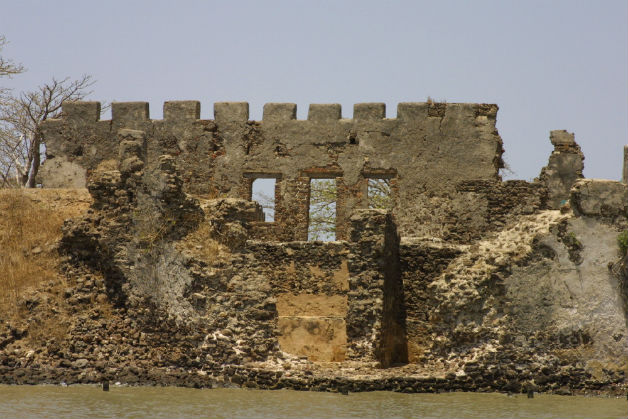"Does reparation start the process of connecting cultures?"
June 3rd, 2012 In November 2006, Prime Minister Tony Blair of the United Kingdom issued an apology for his country’s past role in the slave trade. The move sparked fresh hopes among some that official reparations might follow. Ariela St Pierre-Collins, 15, a Canadian teenager living in the West Indies, wonders how best such a debt can be repaid.
In November 2006, Prime Minister Tony Blair of the United Kingdom issued an apology for his country’s past role in the slave trade. The move sparked fresh hopes among some that official reparations might follow. Ariela St Pierre-Collins, 15, a Canadian teenager living in the West Indies, wonders how best such a debt can be repaid.
I am the descendant of a slave.
I am the descendant of a white slave whose ancestors were forcibly brought from Ireland to the West Indies during the Trans-Atlantic Slave Trade in the 1600’s.
The original culture that my ancestors knew was quickly lost in this new land into which they were thrust. I, like many other West Indians, was jubilant when the ‘Statement Of Regret’ was issued on November 27th 2006 by Tony Blair, Prime Minister of the United Kingdom.
“It is hard to believe what would now be a crime against humanity was legal at the time,” the Prime Minister said. “I believe the bicentenary offers us a chance not just to say how profoundly shameful the slave trade was – how we condemn its existence utterly and praise those who fought for its abolition – but also to express our deep sorrow that it could ever have happened and rejoice at the better times we live in today.”
At last, acknowledgement of wrongdoing by the Mother Country was at hand, surely now reparations would follow. But should all West Indians receive reparation money? Does reparation money bring back lost ancestral cultural identity and start the process of ‘Connecting Cultures’?
I had the privilege of interviewing two important figures pertaining to the issued ‘Statement Of Regret’ who would at first appear to be on polar sides of the argument, but who, surprisingly, ultimately had very similar viewpoints: one whose ancestors were slave-owners, and one whose ancestors were slaves.
I attended a lecture on the legacy of the aristocratic Lascelles family in the United Kingdom at the Barbados Museum at which I was able to interview David Lascelles, the Earl of Harewood, who is a direct descendant of a sugar baron in Barbados whose family was made rich by the slave trade. A successful film producer in his own right, his family owns a vast estate in England that was gotten by the gains of slavery.
Unlike most families who were enriched by the buying, selling and usage of slaves in the sugar trade who try to downplay their unsavoury past, the Lascelles family has for years been transparent with the origins of their wealth. They are somewhat unique in that they have worked to repay the people that were robbed of their lost cultural identity by sponsoring museum exhibitions and organising celebrated African cultural events; namely the hugely popular ‘Carnival Messiah’, a musical performance of Handel’s ‘Messiah’ with an Afro-Caribbean twist.
Lascelles spoke about ‘cultural partnerships’ being more important, “as that is what makes the world go round, and that’s a very good way to give things back”. His opinion on the apology was this: “An apology doesn’t mean very much. I can say sorry for something that I’ve done, for example if I’ve trodden on your foot.
“I find that saying sorry for something that I can take no responsibility for, because it happened in the past, means very little. Being in the present to deal with it, however, with ‘Carnival Messiah’ for example, that does mean something.”
Lascelles’ overriding sentiment is that reparation is all about constant dialogue, open-mindedness and the will to listen as the most effective way to give back. The production of ‘Carnival Messiah’ by David Lascelles and the Lascelles Trust brought together a vast amount of people from many different cultural backgrounds, not only within the audience, but also in the making of the production.
I also interviewed somebody else who would seemingly be on the other end of the argument: Sir Hillary Beckles, Chancellor of the University of The West Indies Cave Hill and acclaimed Afro-Caribbean activist who also happens to be a member of the UNESCO group that pressured the government of the United Kingdom and Tony Blair, Prime Minister, to issue the ‘Statement of Regret’.
Beckles is a firm believer that reparations, though not perhaps of the monetary variety, are long overdue. In fact he believes that people whose families were enriched by slavery should not pay reparation money. “When people are oppressed, their culture goes underground. People like the Lascelles family giving money isn’t the answer.
“Reparation is a conversation or an investment in something like a museum, an art gallery, a library, a monument, donating to historical records or even music, and in doing that, you reconcile the past and the present.” His view on the Statement of Regret is that although it is a great start, he feels a more structured and formal apology would have been more suitable.
“Suppose I trod on your toe and hurt you. I can give you a ‘Statement Of Regret’, which simply means that I am sorry that it occurred, but I am not responsible for the consequences of that action. If I gave you an apology, I am sorry for treading on your toe, and if there are medical bills associated in the healing of the toe, I will cover it. That is the difference between a ‘Statement Of Regret’ and an apology.”
As the descendant of white slaves brought over hundreds of years ago from Ireland to Barbados to better the lot of their English captors, my reaction on the news of Nov.27th, 2006, is that a ‘Statement Of Regret’ is not enough. One cannot truly apologize for something that happened in the past without some form of compensation. This is where the issue of reparation money comes into play, but not just the mere giving of money to the descendants of slavery.
It is the opinion of many of my fellow West Indians that the government of the United Kingdom owes the descendants of slaves money. I, however, do not agree with this. In my opinion, you must similarly repay what has been taken with what was taken. For example, if I stole an apple from a fruit stand and I put a pear in its place, I would fill the empty space, but not make up for the loss of the apple.
If culture was stolen, culture should be given back. Since no money was stolen, money shouldn’t be given back as a form of reparation. The way forward, to me, is much clearer and profound. The government of the United Kingdom should issue a formal apology and instead of paying reparation money, it should sponsor events similar to ‘Carnival Messiah’, erect monuments, and host exhibits in museums and art galleries throughout the West Indies and the United Kingdom.
This way, they will start on the path of truly giving back the lost ancestral cultural identity and heritage that was taken when the slaves were brought over from foreign shores to the Caribbean to work the lands for the sugar, tobacco and cotton trades for England. This will be the start for ‘Connecting Cultures’.
The significance of the ‘Statement Of Regret’ issued by the government of the United Kingdom was great in that it was a huge step as a conciliatory measure in ‘Connecting Cultures’. That is how the process of reparation begins, with an acknowledgement of wrongdoing. Following the acknowledgement of wrongdoing is forgiveness, and then the linking of cultures.
Although we originate from different ancestral backgrounds and we would seemingly have diverse opinions on reparations for slavery; David Lascelles, a descendant of slave owners, Sir Hillary Beckles, a descendant of black slaves, and I, a descendant of white slaves, all share a nearly identical view that lost ancestral heritage can start to be recovered by dialogue, conversation and with a commitment to connecting cultures.
The ‘Statement Of Regret’, therefore will always be a historical milestone in the connection of cultures within the Commonwealth.
…………………………………………………………………………………………………………………
About me:
I am a Barbadian-Canadian and the founder of ‘Youth For Epic Change’, a charity aimed at raising funds for causes both locally and globally and inspiring teens in Barbados to be the catalyst for positive change. View my personal blog at www.unleashthepowerofone.tumblr.com.
…………………………………………………………………………………………………………………
Opinions expressed in this article are those of the author and do not necessarily represent the views of the Commonwealth Youth Programme. Articles are published in a spirit of dialogue, respect and understanding. If you disagree, why not submit a response?
To learn more about becoming a Commonwealth Correspondent please visit: http://www.yourcommonwealth.org/submit-articles/commonwealthcorrespondents/ …………………………………………………………………………………………………………………




